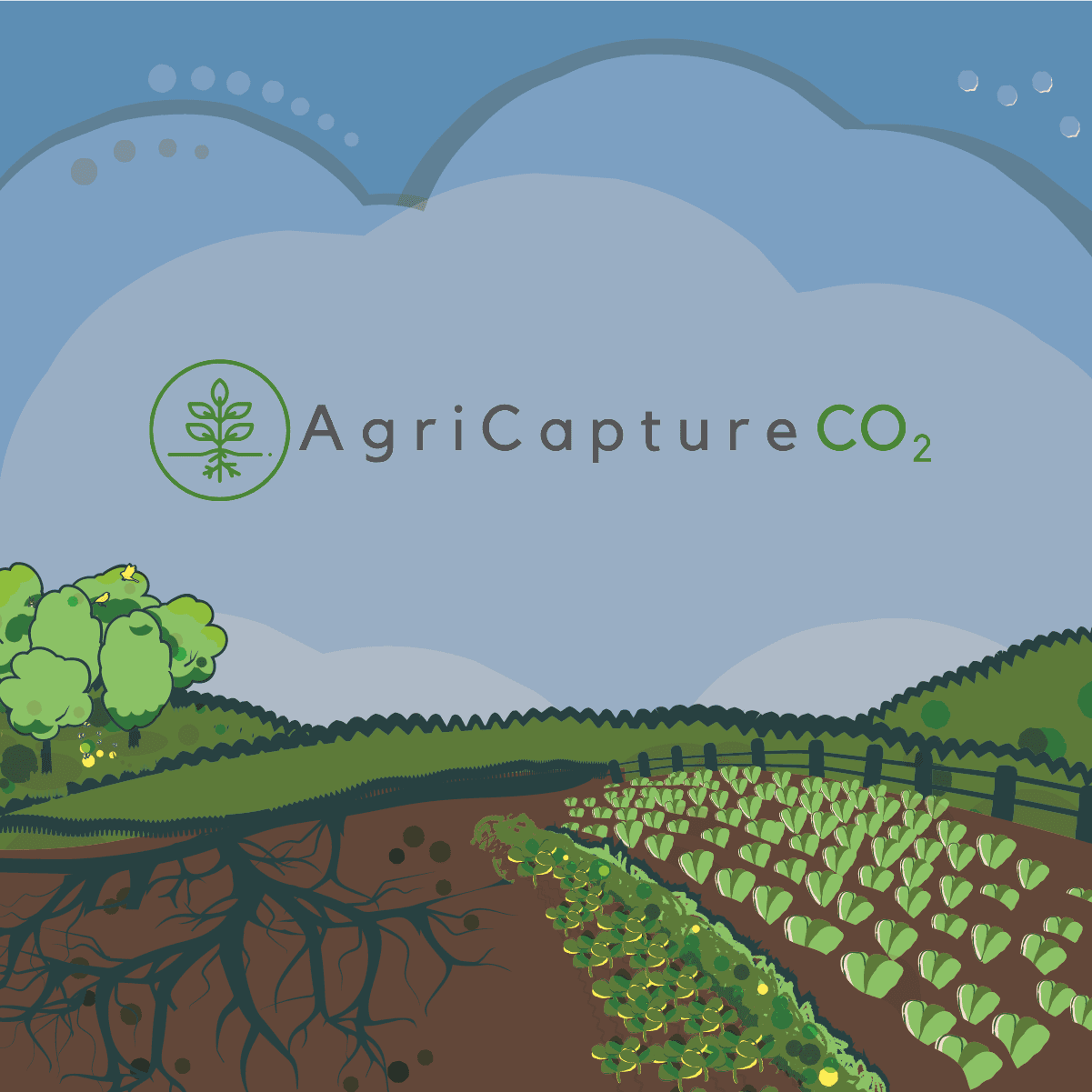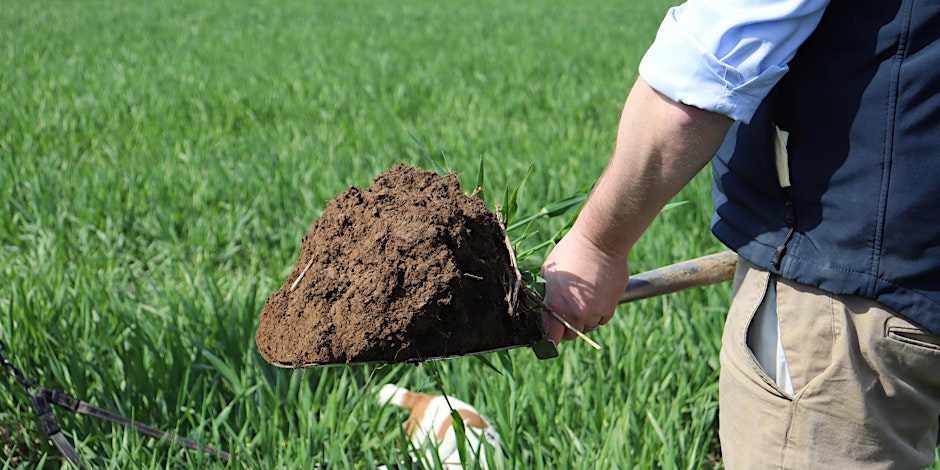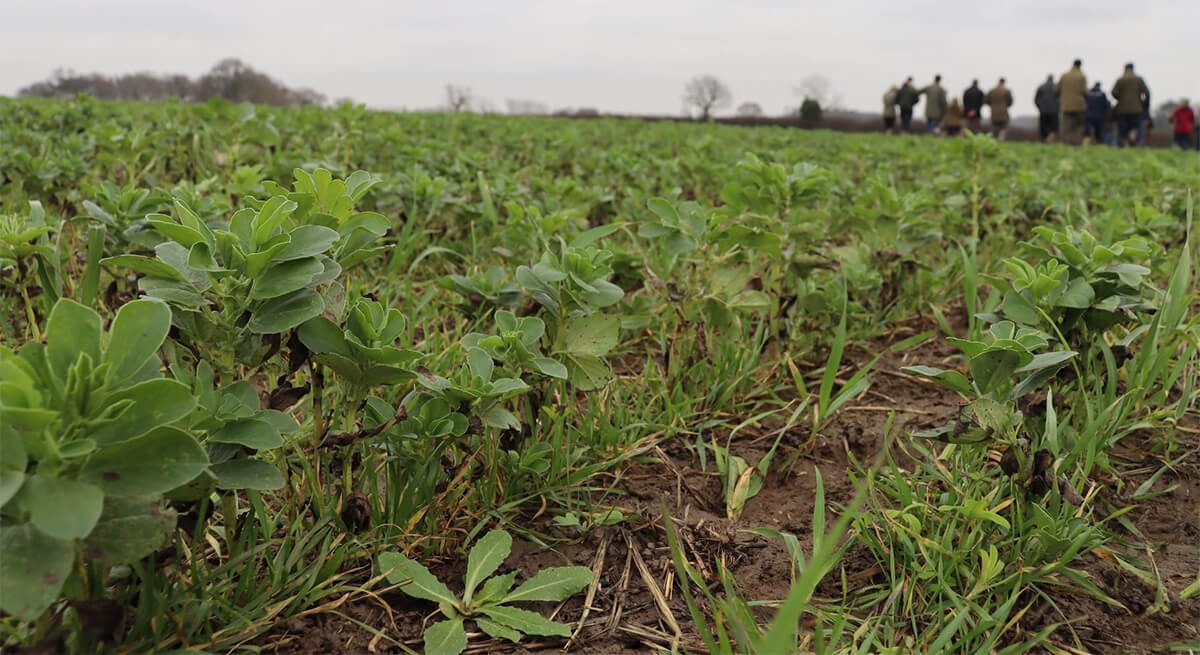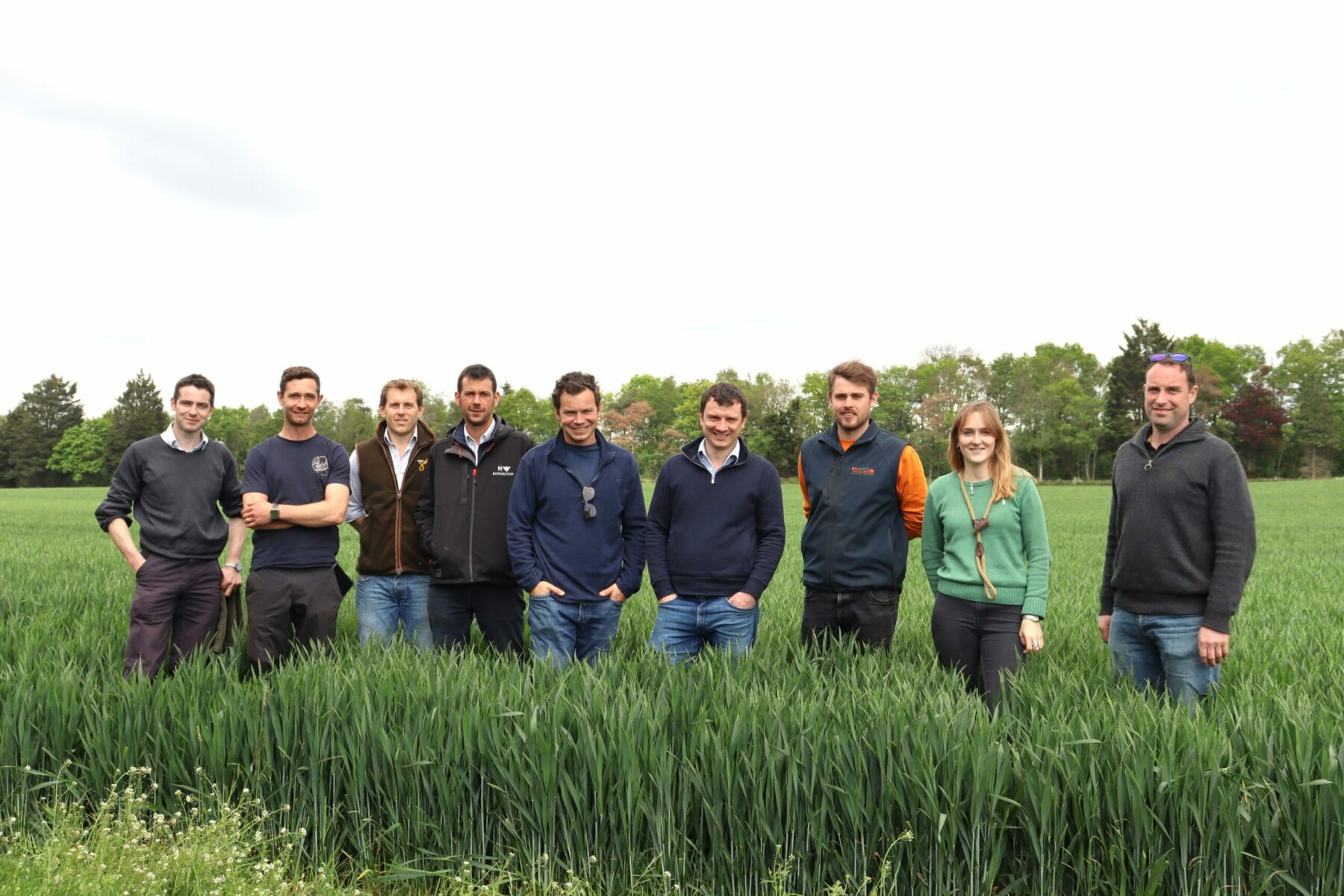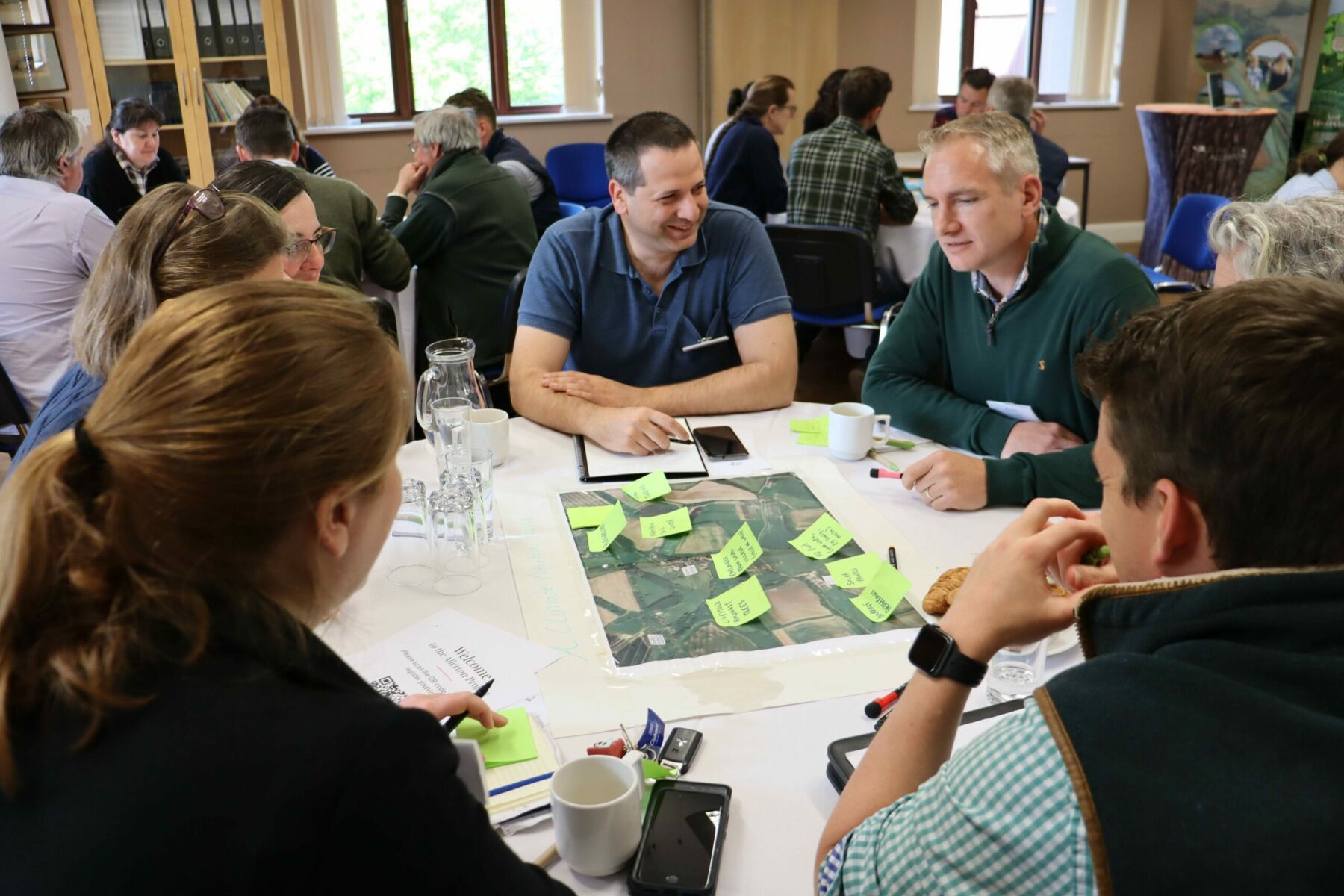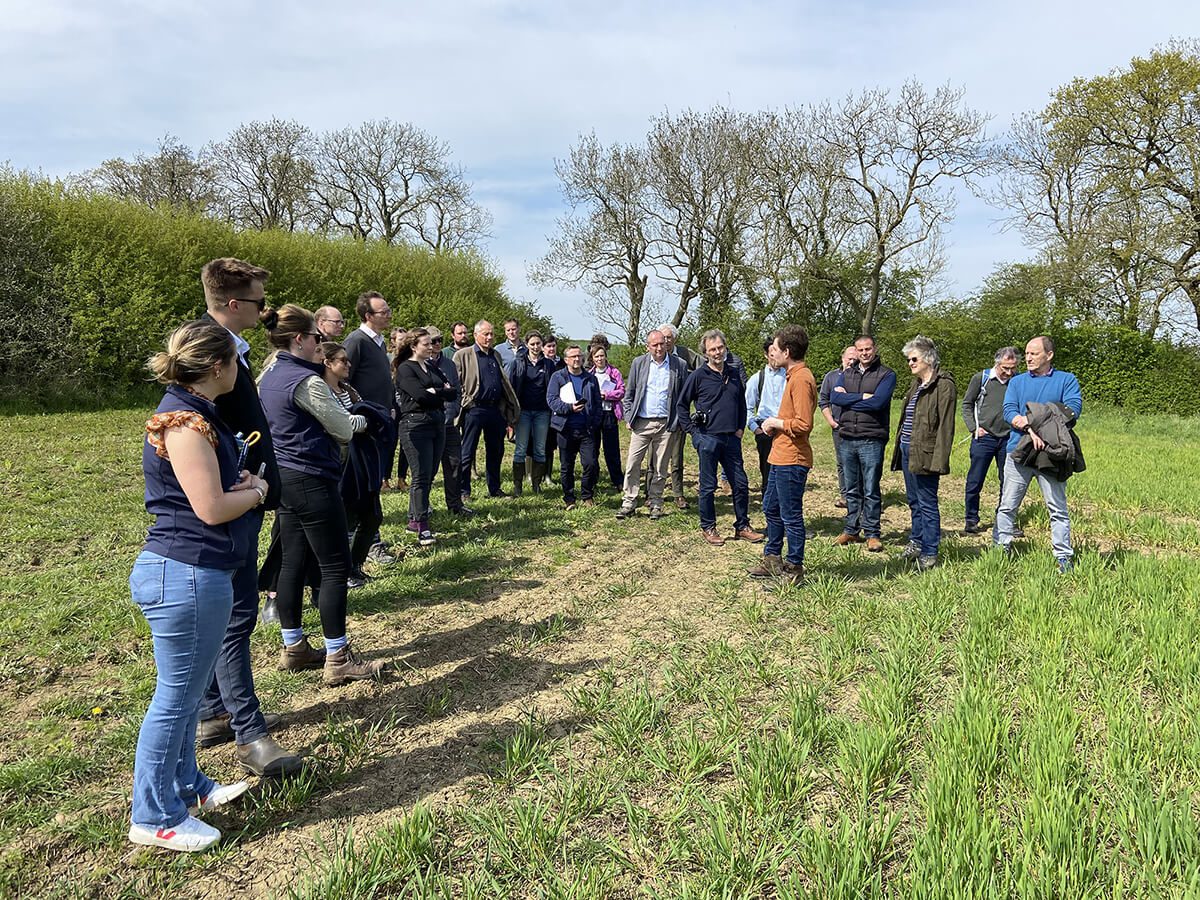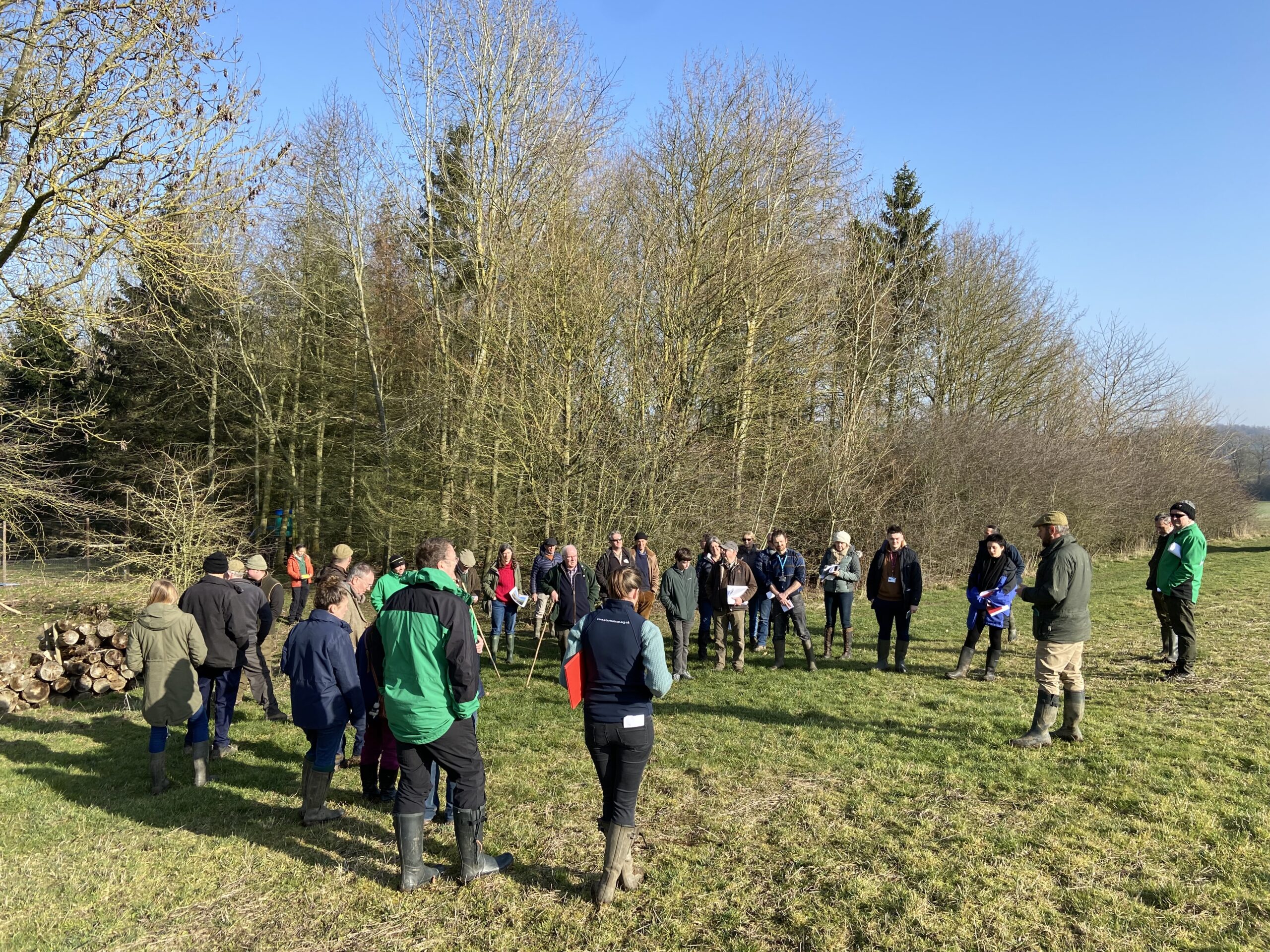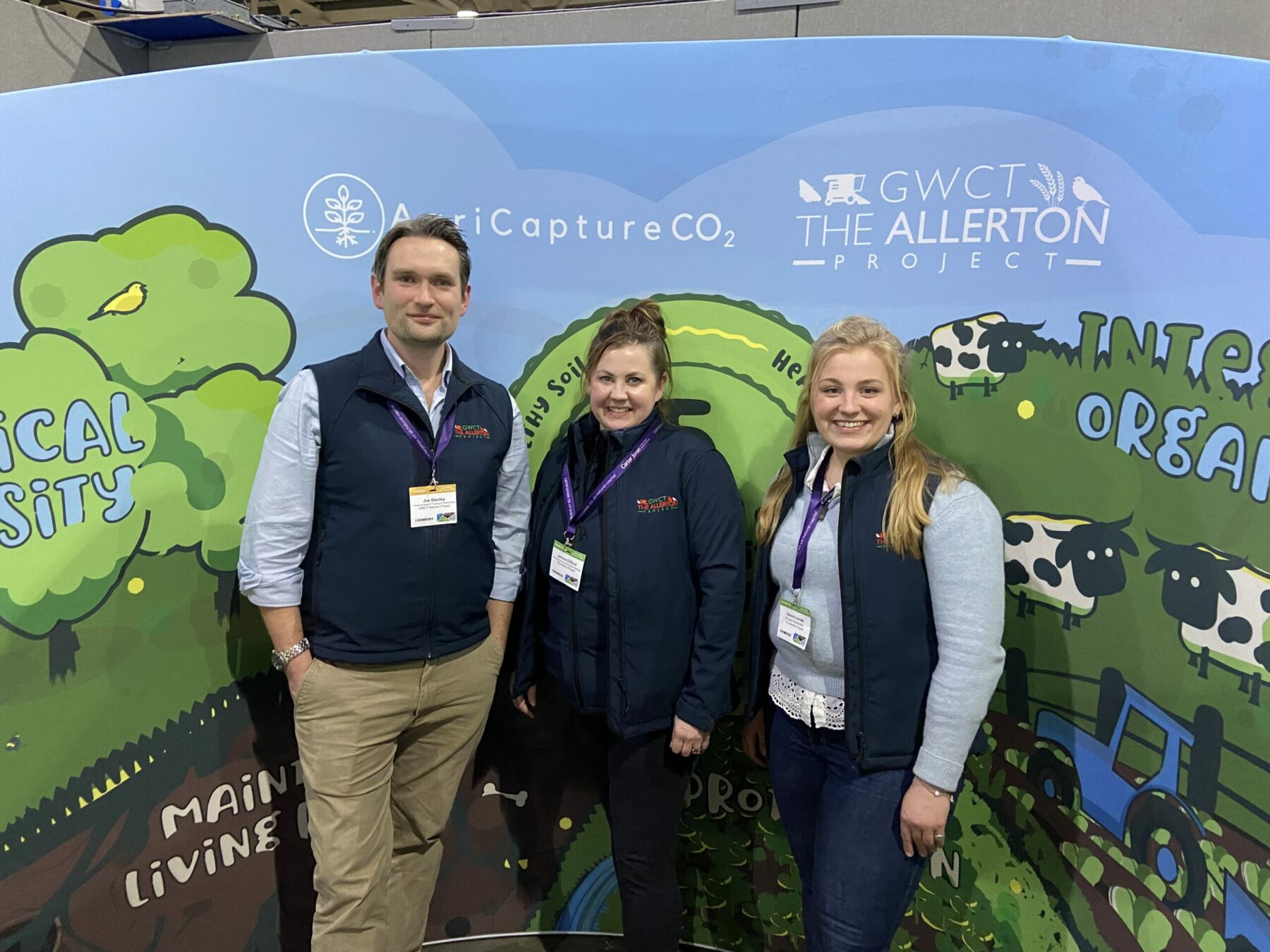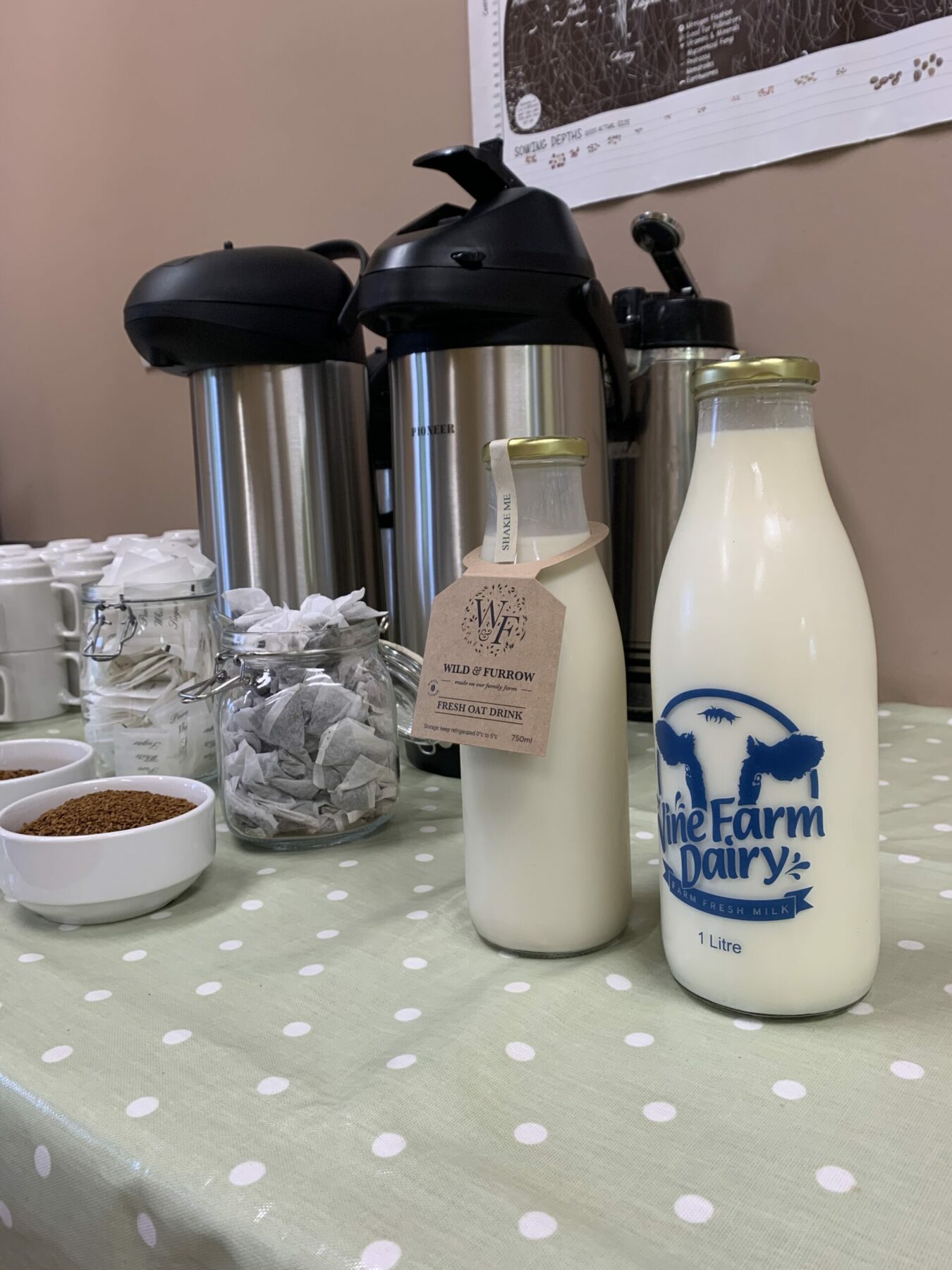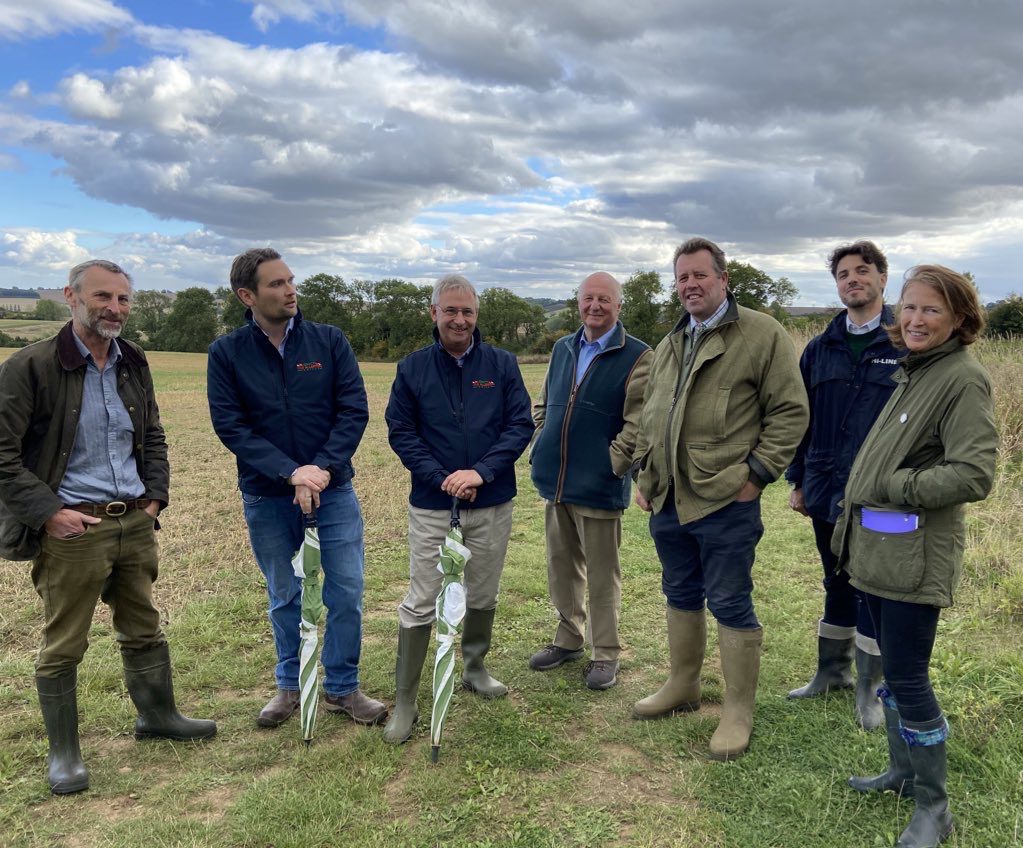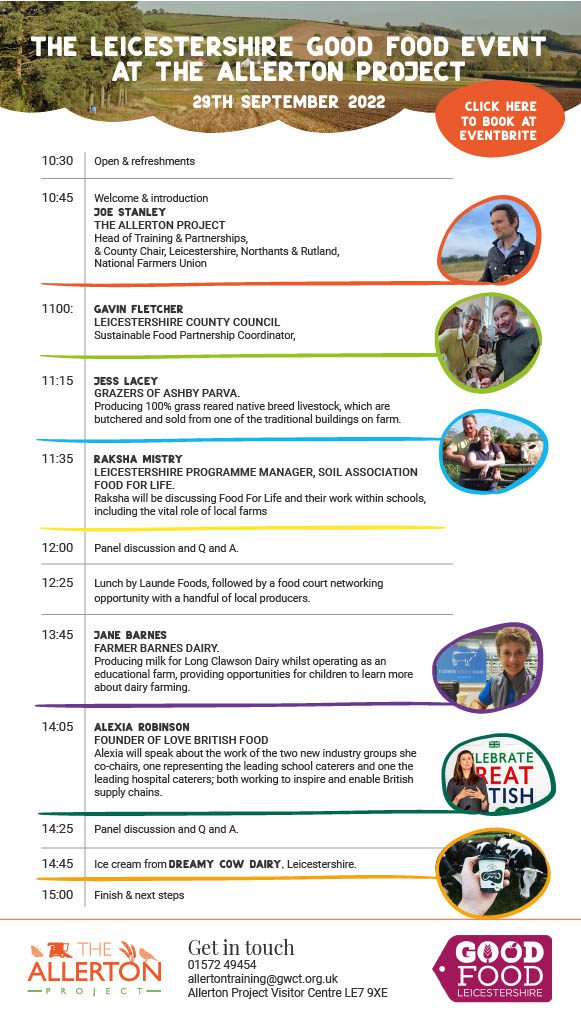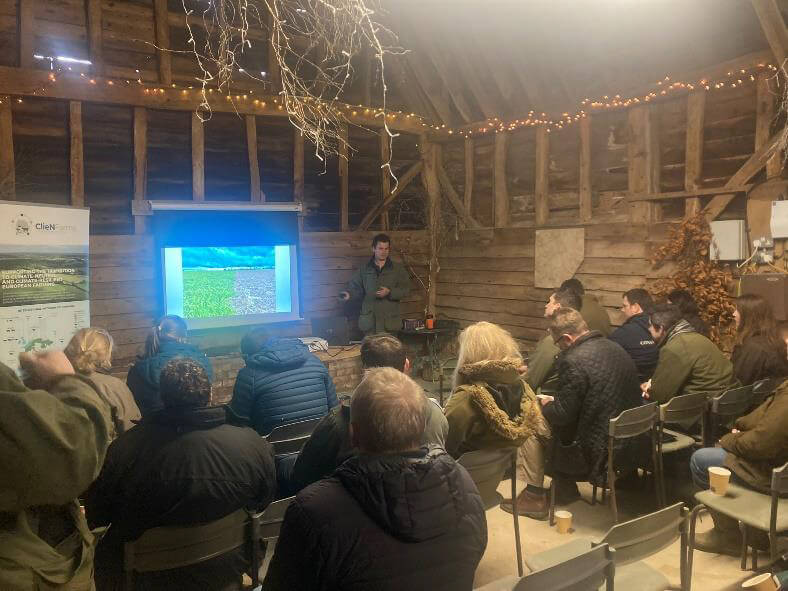

Toby Simpson
Cover Crops Tour
When it comes to soil health and regenerative management, one farming technique seems to be at the forefront of conversation recently, the establishment and use of cover crops. In January, The Allerton Project organised a cover cropping event as part of the ClieNFarms project: ‘Cover Cropping for Climate Neutral Farming’. The event involved a presentation and farm tour and with Toby Simpson, who completed his Nuffield Farming Scholarship titled ‘Catch and Cover Cropping Opportunities in UK Arable Agriculture’ last year. Toby discussed the key findings from his research and explained how he is putting them into practice on his family farm in Cambridgeshire, growing targeted cash crops in a highly biodiverse system.
During the farm tour, Toby discussed his involvement in Wildfarmed Wheat, which involves growing wheat with reduced fertilisers and no pesticides to make regenerative flour. The group also visited fields of different cover crop mixes, such as AB15 legume fallows and AB9 winter bird feeding, where Toby discussed strategies to manage intercrops and different termination strategies. To complete the farm tour, Toby discussed some of the difficulties of farming on different soil types, in particular peaty soils high in organic matter. Whilst these soils can be good growing medium for root crop rotations, they are particularly susceptible to weeds and erosion, not to mention larger emitters of CO2.
Section 1 – Introduction
When it comes to protecting our soils, one farming technique seems to be at the forefront of conversation recently, the establishment and use of cover crops. However, as Baxter, Egan and Nightingale (2023) describe in their suitably titled article, ‘the benefits of cover crops – much more than just soil health’, using cover crops has the potential to provide additional ‘goods’ in terms of keeping the environment and your wallet happy. It goes without saying then that many farmers are using cover crops to ascertain exactly what potential benefits they may bring to a rotation (AHDB, 2024).
Toby Simpson, who completed his Nuffield Farming Scholarship titled ‘Catch and Cover Cropping Opportunities in UK Arable Agriculture’ last year, is doing more than many. A requirement of The Nuffield Farming Scholarship is for scholars to travel anywhere in the world for a period of no less than 8 weeks to further their knowledge and understanding of their chosen study topic (Nuffield Scholar, 2024). By travelling to a range of farms across Europe and North America, Toby increased his understanding of cover cropping opportunities and practice in the UK, all the while noting that context is key, as farmer soil, climate and business will vary significantly (Simpson, 2023). This article will identify some of the fundamental benefits of using cover cops; introduce Toby’s key findings from his Nuffield Scholarship and provide an overview of a recent event organised by The Allerton Project, hosted at Toby’s family farm in Cambridgeshire.
Section 2 – To cover crop, or not to cover crop?
On a basic level, the purpose of cover crops is to ‘cover bare soil and stubble left by cash crops like maize and cereals’ (DEFRA, 2024). Cover crops can be planted at any time of the year, but typically they’re planted after your main crops have been harvested, usually in Autumn, and then grown until you plant your next crop in the Spring (McNiff, 2022). DEFRA (2024) suggest that plants suitable for a cover crop are: cereals and grasses, legumes, brassicas and herbs. The type of cover crop you choose will depend on various factors, such as: rotation, soil type and structure, duration of cover, termination etc (Greenland Seeds Ltd, 2024). Some of the key benefits of using cover crops are outlined here.
Section 3 – ‘Catch and Cover Cropping Opportunities in UK Arable Agriculture’ – key findings
Below is a summary of the key findings from Toby Simpson’s Nuffield Scholarship – ‘Catch and Cover Cropping Opportunities in UK Arable Agriculture’.
You can read Toby’s full Nuffield Scholarship here:
Catch and Cover Cropping – Toby Simpson.pdf (nuffieldscholar.org).
- Cover crops are the keystone to the biological, chemical, and physical function of the soil. They form part of the wider system that works to build healthy soils, this change takes time and patience
- Growers need to understand the carbon and nitrogen cycles in the soil for successful outcomes. Avoid nutrient immobilisation while better managing artificial inputs. Feed the soils, and they will feed the plants
- When growing cover crops, think FDD, functionality, diversity, and density. Set out with clear objectives and a management plan. Treat the cover crop with the same care and attention as any cash crop
- Build resilience into a farm business by farming layered, not naked. If cover crops are part of a broader system change, then the opportunities that come through changing the system are only limited by our imaginations
- Always consider individual context as it varies between farms and fields
Section 4 – ClieNFarms event: Cover Cropping for Climate Neutral Farming – Tour with Toby Simpson
In January, The Allerton Project organised a cover cropping event as part of the ClieNFarms project: ‘Cover Cropping for Climate Neutral Farming’. The event involved a presentation and farm tour and with Toby Simpson, who discussed the key findings from his Nuffield Scholarship and explained how he is putting them into practice on his family farm in Cambridgeshire, growing targeted cash crops in a highly biodiverse system. A total of 35 attendees joined for the event, including farmers, agronomists, consultants and public servants.
During the farm tour, Toby discussed his involvement in Wildfarmed Wheat, which involves growing wheat with reduced fertilisers and no pesticides to make regenerative flour. Wildfarmed works with 95 farmers across the UK, plus some of the original farmers in France who have been involved since the project began in 2019 (Wildfarmed, 2024). ‘Embracing a new way of farming requires courage to go against the grain’, says Wildfarmed (2024), who have established a set of regenerative agriculture standards for farmers to follow. These are:
- Cash crops sown with either pulses or annual/perennial companions
- Minimise bare soil: overwinter cover crops ahead of spring drilling
- Nutrition based on need: plant sap analysis, leaf testing and a maximum of 80kg nitrogen / ha application
- No insecticides, fungicides or herbicides
- Integrate livestock into the cropping system at least once in a three year rotation
You can find out more about Wildfarmed Wheat and their agricultural standards on their website:
Wildfarmed.
The group also visited fields of different cover crop mixes, such as AB15 legume fallows and AB9 winter bird feeding, where Toby discussed strategies to manage intercrops and different termination strategies. To complete the farm tour, Toby discussed some of the difficulties of farming on different soil types, in particular peaty soils high in organic matter. Toby highlighted that some areas of Holme Wood Lodge contain an average of 46% organic matter whilst some of the soils contain as much as 76%. Whilst these soils can be good growing medium for root crop rotations, they are particularly susceptible to weeds and erosion, not to mention larger emitters of CO2.
Toby is one of nine farmers part of the Climate Neutral Farms project. ClieNFarms is an EU Horizon project aiming to scale up systemic and locally relevant solutions to foster climate-neutral and climate-resilient farms across Europe. As one of our lead commercial farmers in the project, Toby is adopting more sustainable production methods to help decarbonise the Nestle cereal supply chain in the East of England.
You can find out more about the project here:
Clien Farms | The Allerton Project (allertontrust.org.uk)
Section 5 – Conclusions
Cover crops have undoubtedly become more popular, or even ‘fashionable’, over the past couple of years: ‘Growing cover crops is in vogue’ (16 Things Everyone Should Know About Sustainable Fashion | British Vogue ) says Toby (Nuffield Scholar, 2022). However, ‘the application is less straightforward’, and as with most agricultural practices, favourable outcomes may take their time to materialise. Toby (2023) suggests the answer is to set clear, achievable objectives – ‘expectations must be balanced with reality: every year is different, having flexibility and experience will help navigate these challenges’.
Section 6 – References
- The benefits of cover crops – much more than just soil health. Lexie Baxter, Jim Egan and Rob Nightingale (2023) The benefits of cover crops – much more than just soil health – Frontier Blog – Frontier Agriculture
- An introduction to cover crops. AHDB (2024) An introduction to cover crops | AHDB
- Why and what is a Nuffield farming scholarship? Nuffield Scholar (2024) Why & What is a Nuffield Farming Scholarship? | Nuffield Farming Scholarships (nuffieldscholar.org)
- ‘Catch and cover cropping opportunities in UK arable agriculture’. Toby Simpson (2023) Catch and Cover Cropping – Toby Simpson.pdf (nuffieldscholar.org)
- Use cover crops or green manure. DEFRA (2024) Use cover crops or green manure – Farming (blog.gov.uk)
- Cover crops benefit both commercial farmers and urban gardens. Nancy McNiff (2022) Cover Crops Benefit Both Commercial Farmers and Urban Gardeners | Farmers.gov
- The benefits of cover crops. Greenland Seeds Ltd (2024) The Benefits of Cover Crops | Greenland Seeds
- Wildfarmed Wheat (2024) Our Growers (wildfarmed.co.uk)
- Toby Simpson. Nuffield Scholar (2022) Toby Simpson | Nuffield Farming Scholarships (nuffieldscholar.org)

